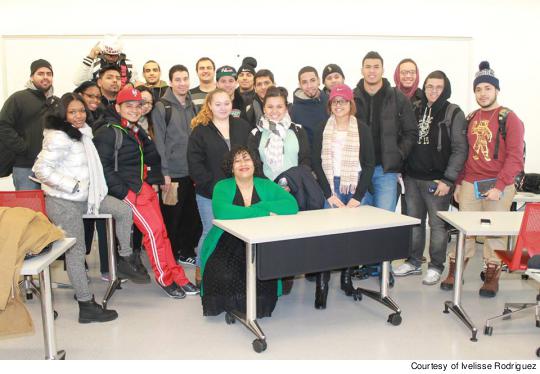It’s been nearly six years that PSC members have been working without a raise. The stagnant wages, the austerity conditions, the doing-more-with-less mind-set have all hurt CUNY – especially its students – in significant ways.

Since the expiration of the last contract in October 2010, housing and transportation costs have steadily increased while wages have remained stagnant, leading to worries about retaining talented faculty and forcing many who work at CUNY to live far from their place of employment. When educators can’t afford to fully take part in their college communities, students are the ones who ultimately suffer.
Between 2011 and 2014, median rents in the city outpaced the rate of inflation. Meanwhile, PSC members are stuck at 2010 levels of compensation. According to the US Census Bureau, when utility costs are included in the calculation, median rental housing costs in New York City rose during that period by 4.3 percent. Over the last year, it has only gotten worse, according to real estate expert Jonathan Miller, who writes in the Elliman Report that between January 2014 and January 2015, the median Manhattan rent rose by 5.9 percent, while the median rent in Queens soared by more than 30 percent.
Department heads and program administrators tell Clarion they have had trouble recruiting top candidates. Several prominent academics have recently left CUNY, touching off a new round of worries about retention in the absence of a contract.
Here, CUNY faculty share how working five years without a contract affects their work lives and their ability to give students the educational experience they deserve. There are more stories than we can include here; future issues of Clarion will include reports from other faculty and staff about the cost to CUNY students of management’s failure to settle a contract. Clarion wants to hear from you: To share your story, contact Clarion editor Adele Stan at [email protected].
XiangDong Li
Professor, Computer Systems Technology
New York City College of Technology
I am in charge of computer and network security courses at the Department of Computer Systems Technology. We offer 24 sections of classes each year and there’s increasing demand for our courses. However, I am the only full-time faculty member in the department who teaches these sections; all others are taught by adjunct faculty.
We have tried very hard to hire new and qualified full-time faculty members in this field, but failed. If I retire in a few years, I am not sure these courses can be provided by the department. Five years ago, our security program was competitive with those at NYU Polytechnic, Pace University and New York Institute of Technology, but now we are getting weaker and weaker due to the lack of qualified full-time faculty. [People at other institutions know that] we have not gotten a raise in six years, while the cost of living, transportation and food have increased each year. I’m worried that our lack of salary increases will continue to make it difficult to recruit faculty, and our department will continue to suffer.
Ivelisse Rodriguez
Former Asst. Professor, English Borough of Manhattan
Community College
 |
Being Puerto Rican, I think it is important for students to see role models who look like them. I came to CUNY because I wanted to work in a more diverse environment and I got that at BMCC. I taught English composition, and each semester the typical class size was 29 students – an excessive number for a writing course. I couldn’t effectively teach writing with a class that large.
Students come in with many writing issues, such as problems with grammar and essay organization. For many, English is their second language. At times, I would have more than 90 papers submitted within a single week. When giving feedback to students, I would sometimes have to go with my surface-level thoughts rather than going deeper because I had to keep grading. I felt that the workload didn’t allow me to do right by my students. It was exhausting, and I felt that I spent most of my time working. I resigned this past spring because I felt there was no work-life balance.
Heather Robinson
Associate Professor, English
York College
Our stagnant pay is impacting my department in terms of on-campus presence for full-time faculty. I live in New Jersey, partly because of the lower cost of living. My days at York are long because I try to commute to the college as few times a week as possible; tolls and train fares keep rising, but our salaries stay the same. Starting this fall, going to campus three days a week on the train brings my weekly commuting cost to more than $120. I can drive, but the tolls keep going up, too. The lack of a contract means that telecommuting for certain aspects of my job is the only financially feasible option.
Some of my colleagues have also moved out of the city. They come to campus less often because commuting costs make coming to campus tough. That means students have fewer opportunities for face-to-face time with us – fewer chance meetings in the hallways, and less participation by faculty in extracurricular activities. As deputy chair of my department and writing program director (reassigned-time roles I’m filling because of faculty attrition) I would like to be on campus more often, but the lack of a new contract means that it’s just not possible.
Rebekah Johnson
Associate Professor, Education and Language Acquisition
LaGuardia Community College
 |
I am considering leaving CUNY because the cost of living in New York City is too high, and our salaries, due to our lack of a contract, are not keeping pace. While our salaries remain stuck at 2010 levels, rent is increasing at a ridiculous rate, and it’s difficult to manage other costs, like childcare for my two-year-old son and paying back student loans. It’s increasingly impossible, especially for young families, to live in this city now.
I know one colleague who left New York City and CUNY because he and his wife could not afford good housing for their two children and themselves. Now I’m expecting a second child and we really need to move out of our one-bedroom place, but I don’t know if I can afford a bigger one. If I move out of the city, my commuting time will increase, which means more childcare costs and more time away from my children. I don’t want to leave my job; I love my job! I just became an associate professor and I’m on the tenure track. I’m excited about getting to the point where I am designing my own course content. I like teaching and serving the students of the city. But I’m wondering if I can afford to live in the city with my two kids. I just don’t know.
Jason Schulman
Adjunct Assistant Professor, Political Science
Lehman College
I have worked as an adjunct at Lehman for 10 years. The head of the political science department has been very good to me, ensuring that my reappointment each semester is all but guaranteed. But I am still an adjunct. I have not been offered a full-time tenure-track position. If CUNY schools were funded such that more tenure-track jobs were offered, I suspect this would not be the case and I would be at least a full-time assistant professor in the political science department by now. As it stands, I have had to look for outside work at non-CUNY schools in order to supplement my low income at Lehman. Even with that additional income, I make around $30,000 a year. In New York City, that simply isn’t enough, and if I didn’t live with a partner who makes more than twice what I do, I’d be in serious trouble. I work hard. I’ve worked hard for years. I deserve to be paid a hell of a lot more than I’m currently being paid. And so do my adjunct colleagues at all the CUNY schools. It’s time for CUNY to start paying up.
Carole Harris
Associate Professor, English
New York City College of Technology

I was promoted to associate professor at the same time that my rent increased by $275, so the raise in salary that came with the new position has been completely eaten up by the cost of my rent. I live in a rent-stabilized one-bedroom in South Slope, but my rent, which was $1,700 when I moved in 2010, has still increased significantly in recent years. With my most recent lease, my rent increased by another $100. I had to turn down a modest apartment that completely suited my needs because the rent was too high. I need to move to a less expensive neighborhood, but I fear being priced out of that new neighborhood down the road. Just consider, in July 2010 I was paying $1,100 per month in rent for my old apartment; in August 2015 I am paying $2,200. I’m not willing to move every five years, and I may not be able to afford to buy in New York City. I have devoted my life to higher education, and now, just as I have achieved job security, I’m reckoning with the fact that I can barely afford to live in this city. I feel like I’m living as provisional a life as I did in graduate school, with no chance of saving for the future. It’s scary. Worries such as these make it difficult to find the peace of mind required to do the research and writing that make a successful academic career.

